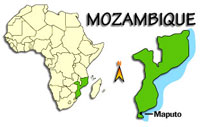Mozambique HIV patients protest, fearing loss of privacy
 Maputo - Hundreds of Mozambicans suffering with HIV/AIDS protested Thursday in front of the country's major hospital against the closure of their special care units, saying they fear loss of privacy with the move.
Maputo - Hundreds of Mozambicans suffering with HIV/AIDS protested Thursday in front of the country's major hospital against the closure of their special care units, saying they fear loss of privacy with the move.
The protests at the Hospital Central de Maputo (HCM) followed the recent announcement by Mozambican Health Minister Ivo Garrido that specialized units for HIV/AIDS treatments were to be closed.
The units, known as Centro Dia, are independently run by nongovernmental organizations and offer specialist services, including counselling, testing, treatment and follow-up in the privacy of dedicated centres.
Instead, HIV/AIDS patients were to be integrated into the regular health services at all centres around the country, the government ordered.
"The problem is that when they call us to go and receive our medication, they expose us to other patients. Everyone at the health centre will know for sure we're HIV or AIDS patients," Maria Jose, 27, said in an interview.
The patients protested that the new measure would bring further discrimination as soon as they were recognized by their peers as seeking care for HIV and AIDS.
Maputo has an estimated 20,000 people registered in the Centro Dia system. That includes 5,700 on anti-retroviral treatment. All in all, Mozambique, with a population of
20.3 million inhabitants, has about 1.4 million people believed to carry the virus that causes AIDS.
Most are likely unaware of their status, and health workers battle against the stigma of the fatal illness to get people to consent to testing and treatment.
Mozambican authorities argue that such services do not need to be separated from those offered under the National Health Service.
Some protestors said their integration into the regular service would likely lead people to abandon treatment.
Across the country, more than 100,000 people are on anti- retroviral treatment (ARVs). After a slow start to the rollout, the drugs are now available in all 128 districts.
The local coordinator for Medicins Sans Frontieres, which is currently providing ARVs to at least 4,000 people in Maputo, said losing patients from treatment programmes would be "disastrous."
A study carried out by the World Health Organization and the health ministry at 17 ARV supply sites in three provinces - Nampula, Sofala and Maputo - showed around 8 per cent of HIV patients were lost to follow-up over a year's span from 2007 to 2008. (dpa)